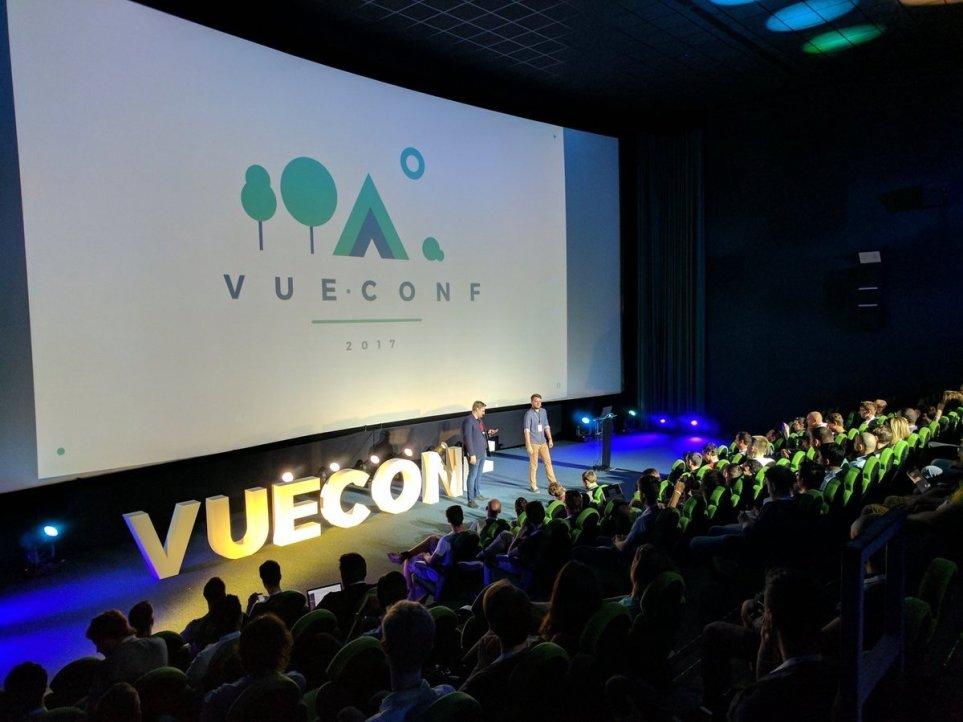June 30, 2017
VueConf 2017
Factorial took part in the first international developer conference dedicated to the progressive JavaScript framework Vue.js. Here are my impressions after two days filled with inspiring presentations.

Being a partner at Factorial first and a frontend developer second I’m not going to address every talk but rather focus primarily on our business perspective. You can get an overview of the speakers and presentations at the official VueConf website. The conference organizers are currently editing the video coverage and I’ll update the article once they are published.
The vue ecosystem is thriving
Evan You addressed the state of Vue in his opening keynote. Vue.js is now the second most starred JavaScript frontend framework at GitHub . Roughly 200.000 active users open the Vue developer tools on a weekly base. The roadmap for 2.4. is focused on improving server-side rendering performance and providing official testing utilities. Lots of impactful commercial players are adopting vue.js.
Documentation matters, a lot.
One of the main traits of Vue.js is that is easily approachable and adaptable. Not only from having an elegant API, but also from having fantastic hard and soft documentation. Chris Fritz is one of the main contributors to that and spoke about different integration techniques (people and technology). When introducing new technology be empathic to your peers, don’t talk down to them, but rather identify with their pain points and how Vue.js solves those.
Besides Vue.js is extremely flexible in its degrees of integration. When including it the simplest way and forcing synchronous execution, your content actually gets indexed by search engines without setting up complex SSR. We’re going to investigate further how we can leverage Vue.js in our existing PHP-based backend development stack while simultaneously advancing decoupled applications.
Vue.js allows for gradual migration in large-scale code bases
GitLab is awesome. We use it daily at Factorial. Filipa Lacerda gave a great presentation why they chose Vue.js and how their development team gradually migrates their code base from a traditional Ruby on Rails frontend stack (asset pipeline, CoffeeScript, jQuery …) to modern JavaScript and Vue.js. It reminded me again how fast web development is progressing nowadays.
As some new hot sauce comes along, we as developers often have the notion to go for a full rewrite. We tend to forget that people make decisions based on the best of their knowledge and abilities at a given time. And once you have a product that creates actual value for its users and customers, you’ll have to constantly maintain and innovate.
The future of mobile app development is diverse
From web apps to progressive web apps, to hybrid apps and native bindings for UI components there are several competing approaches, each of them having their advances and tradeoffs. The Vue.js ecosystem offers integrations in each area but I would currently not bet on an eventual winner.
Vue.js puts the fun back in Programming
If there is one repeating topic from the conference it would be how pain-free the development workflow is with Vue.js. Not only from having a first-in-class developer experience, but also from the perspective of what you can accomplish in your user-facing product. Only fitting, Sarah Drasner gave the closing talk on how UI animation can directly affect user satisfaction and how to leverage the transition system of Vue.js.
Conclusion
We at Factorial bought into Vue.js about 1,5 years on a couple of small encapsulated UI features and are currently working on a full-scale, decoupled Vue.js app. VueConf assured us that Vue.js is here to stay and we’ll continue exploring our options within its fantastic ecosystem.
Additional Ressources
- https://github.com/nuxt/nuxt.js
- https://github.com/vuejs/vetur
- https://github.com/TheLarkInn/threeve
- https://github.com/monterail/vuelidate
- https://about.gitlab.com/2017/02/06/vue-big-plan/
- https://github.com/rigor789/nativescript-vue
- https://github.com/OnsenUI/OnsenUI
- https://github.com/Akryum/vue-apollo
- https://github.com/facebook/jest
- https://github.com/sdras/nuxt-type
